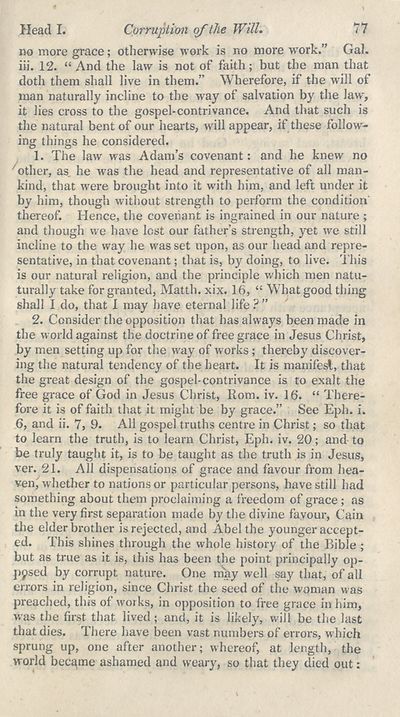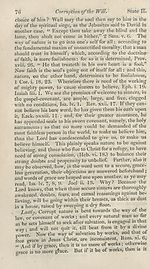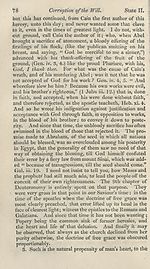Download files
Complete book:
Individual page:
Thumbnail gallery: Grid view | List view

Head I. Corruption of the Will. 77
no more grace; otherwise work is no more work.” GaJ.
hi. 12. “ And the law is not of faith; but the man that
doth them shall live in them.” Wherefore, if the will of
man naturally incline to the way of salvation by the law,
it lies cross to the gospel-contrivance. And that such is
the natural bent of our hearts, will appear, if these follow¬
ing things he considered.
1. The law was Adam’s covenant: and he knew no
/other, as. he was the head and representative of all man¬
kind, that were brought into it with him, and left under it
by him, though without strength to perform the condition
thereof. Hence, the covenant is ingrained in our nature ;
and though we have lost our father’s strength, yet we still
incline to the way he was set upon, as our head and repre¬
sentative, in that covenant; that is, by doing, to live. This
is our natural religion, and the principle which men natu-
turally take for granted, Matth. xix. 16, “ What good thing
shall I do, that I may have eternal life ? ”
2. Consider the opposition that has always been made in
the world against the doctrine of free grace in Jesus Christ,
by men setting up for the way of works; thereby discover¬
ing the natural tendency of the heart. It is manifest;, that
the great design of the gospel-contrivance is to exalt the
free grace of God in Jesus Christ, Rom. iv. 16. “ There¬
fore it is of faith that it might be by grace.” See Eph. i.
6, and ii. 7, 9. All gospel truths centre in Christ; so that
to learn the truth, is to learn Christ, Eph. iv. 20; and to
be truly taught it, is to be taught as the truth is in Jesus,
ver. 21. All dispensations of grace and favour from hea¬
ven, whether to nations or particular persons, have still had
something about them proclaiming a freedom of grace; as
in the very first separation made by the divine favour, Cain
the elder brother is rejected, and Abel the younger accept¬
ed. This shines through the whole history of the Bible ;
but as true as it is, this has been the point principally op¬
posed by corrupt nature. One may well say that, of all
errors in religion, since Christ the seed of the woman was
preached, this of works, in opposition to free grace in him,
was the first that lived; and, it is likely, will be the last
that dies. There have been vast numbers of errors, which
sprung up, one after another; whereof, at length, the
world became ashamed and weary, so that they died out;
no more grace; otherwise work is no more work.” GaJ.
hi. 12. “ And the law is not of faith; but the man that
doth them shall live in them.” Wherefore, if the will of
man naturally incline to the way of salvation by the law,
it lies cross to the gospel-contrivance. And that such is
the natural bent of our hearts, will appear, if these follow¬
ing things he considered.
1. The law was Adam’s covenant: and he knew no
/other, as. he was the head and representative of all man¬
kind, that were brought into it with him, and left under it
by him, though without strength to perform the condition
thereof. Hence, the covenant is ingrained in our nature ;
and though we have lost our father’s strength, yet we still
incline to the way he was set upon, as our head and repre¬
sentative, in that covenant; that is, by doing, to live. This
is our natural religion, and the principle which men natu-
turally take for granted, Matth. xix. 16, “ What good thing
shall I do, that I may have eternal life ? ”
2. Consider the opposition that has always been made in
the world against the doctrine of free grace in Jesus Christ,
by men setting up for the way of works; thereby discover¬
ing the natural tendency of the heart. It is manifest;, that
the great design of the gospel-contrivance is to exalt the
free grace of God in Jesus Christ, Rom. iv. 16. “ There¬
fore it is of faith that it might be by grace.” See Eph. i.
6, and ii. 7, 9. All gospel truths centre in Christ; so that
to learn the truth, is to learn Christ, Eph. iv. 20; and to
be truly taught it, is to be taught as the truth is in Jesus,
ver. 21. All dispensations of grace and favour from hea¬
ven, whether to nations or particular persons, have still had
something about them proclaiming a freedom of grace; as
in the very first separation made by the divine favour, Cain
the elder brother is rejected, and Abel the younger accept¬
ed. This shines through the whole history of the Bible ;
but as true as it is, this has been the point principally op¬
posed by corrupt nature. One may well say that, of all
errors in religion, since Christ the seed of the woman was
preached, this of works, in opposition to free grace in him,
was the first that lived; and, it is likely, will be the last
that dies. There have been vast numbers of errors, which
sprung up, one after another; whereof, at length, the
world became ashamed and weary, so that they died out;
Set display mode to:
![]() Universal Viewer |
Universal Viewer | ![]() Mirador |
Large image | Transcription
Mirador |
Large image | Transcription
| Antiquarian books of Scotland > Religion & morality > Human nature in its fourfold state > (95) |
|---|
| Permanent URL | https://digital.nls.uk/118584836 |
|---|
| Description | Thousands of printed books from the Antiquarian Books of Scotland collection which dates from 1641 to the 1980s. The collection consists of 14,800 books which were published in Scotland or have a Scottish connection, e.g. through the author, printer or owner. Subjects covered include sport, education, diseases, adventure, occupations, Jacobites, politics and religion. Among the 29 languages represented are English, Gaelic, Italian, French, Russian and Swedish. |
|---|

